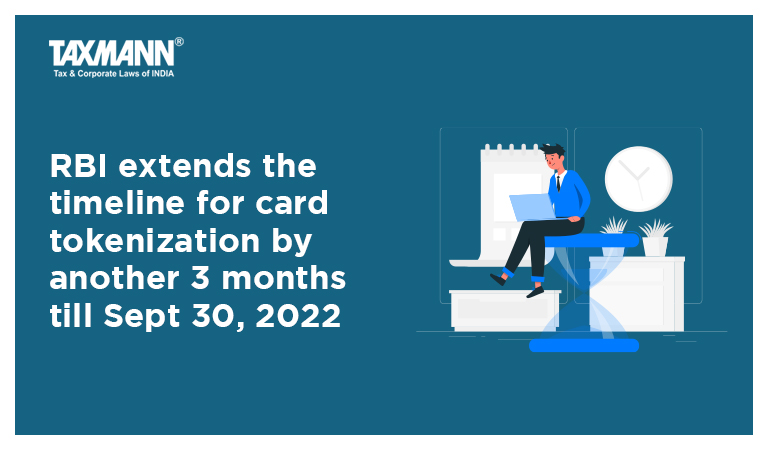RBI extends the timeline for card tokenization by another 3 months till Sept 30, 2022
- Blog|News|FEMA & Banking|
- 2 Min Read
- By Taxmann
- |
- Last Updated on 27 June, 2022

Circular no. RBI/2022-23/77 CO.DPSS.POLC.No.S-567/02-14-003/2022-23, Dated: 24.06.2022
The RBI has observed that an alternate system in respect of transactions where cardholders decide to enter the card details manually at the time of undertaking the transaction has not been implemented by the industry stakeholders, so far. Accordingly, the RBI has decided to extend the timeline for storing of Card-on-File (CoF) data by three months, i.e., till 30.09.2022, after which such data shall be purged. Earlier, the timeline was extended to 30.06.2022.
RBI directed that No entity in the card transaction/payment chain, other than the card issuers and/or card networks, shall store the CoF data, and any such data stored previously shall be purged.
“To create a token under the CoFT framework, the cardholder has to undergo a one-time registration process for each card at every online or e-commerce merchant’s website or mobile application, by entering the card details and giving consent for creating a token. This consent is validated by way of authentication through an AFA. Thereafter, a token is created which is specific to the card and online / e-commerce merchant, i.e., the token cannot be used for payment at any other merchant. For future transactions performed at the same merchant website / mobile application, the cardholder can identify the card with the last four digits during the checkout process.
Till date, about 19.5 crore tokens have been created. Opting for CoFT (i.e., creating tokens) is voluntary for the cardholders. Those who do not wish to create a token can continue to transact as before by entering card details manually at the time of undertaking the transaction (commonly referred to as “guest checkout transaction”). Said RBI
Click Here To Read The Full Circular
Disclaimer: The content/information published on the website is only for general information of the user and shall not be construed as legal advice. While the Taxmann has exercised reasonable efforts to ensure the veracity of information/content published, Taxmann shall be under no liability in any manner whatsoever for incorrect information, if any.

Taxmann Publications has a dedicated in-house Research & Editorial Team. This team consists of a team of Chartered Accountants, Company Secretaries, and Lawyers. This team works under the guidance and supervision of editor-in-chief Mr Rakesh Bhargava.
The Research and Editorial Team is responsible for developing reliable and accurate content for the readers. The team follows the six-sigma approach to achieve the benchmark of zero error in its publications and research platforms. The team ensures that the following publication guidelines are thoroughly followed while developing the content:
- The statutory material is obtained only from the authorized and reliable sources
- All the latest developments in the judicial and legislative fields are covered
- Prepare the analytical write-ups on current, controversial, and important issues to help the readers to understand the concept and its implications
- Every content published by Taxmann is complete, accurate and lucid
- All evidence-based statements are supported with proper reference to Section, Circular No., Notification No. or citations
- The golden rules of grammar, style and consistency are thoroughly followed
- Font and size that’s easy to read and remain consistent across all imprint and digital publications are applied



 CA | CS | CMA
CA | CS | CMA
